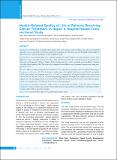Please use this identifier to cite or link to this item:
https://hdl.handle.net/20.500.14356/1031| Title: | Health-Related Quality of Life of Patients Receiving Cancer Treatment in Nepal: A Hospital-based Cross-Sectional Study |
| Authors: | Khatiwoda, Shiva Ram Dhungana, Raja Ram Sapkota, Vishnu Prasad Singh, Sarswoti |
| Citation: | hatiwodaS. R., DhunganaR. R., Sapkota V. P., & Singh S. (2021). Health-Related Quality of Life of Patients Receiving Cancer Treatment in Nepal: A Hospital-based Cross-Sectional Study . Journal of Nepal Health Research Council, 19(1), 26-31. https://doi.org/10.33314/jnhrc.v19i1.3052 |
| Issue Date: | 2021 |
| Publisher: | Nepal Health Research Council |
| Article Type: | Original Article |
| Keywords: | Cancer EORTC QLQ-C30 Health-related quality of life |
| Series/Report no.: | Jan-March, 2021;3052 |
| Abstract: | Abstract Background: Information on health-related quality of life of the patients enables healthcare providers to understand patients’ concerns and guides to introduce appropriate treatment care. This study assessed the health-related quality of life of the cancer patients attending a tertiary hospital in Nepal. Methods: A cross-sectional study was conducted among 294 cancer patients receiving treatment service from Bhaktapur Cancer Hospital between November 2016 and February 2017. We used the European Organization for Research and Treatment of Cancer, Quality of Life Questionnaire-Core 30 to record the scores in different domains of health-related quality of life. The scores were compared across different socio-economic characteristics using non-parametric tests. Results: Majority of the participants were female (57.5%), of age 50 years and above (64.7%) and had either lung or breast or cervical cancer (49.32%). Participants’ median scores of the global health status (overall health) and quality of life, functionality, and symptoms were 83.3, 52.7 and 31.9 respectively. Among functionality, lower mean scores were of role (45.40) and social (53.17) functioning. Among symptoms and single items, higher mean scores were of appetite loss (49.88), fatigue (46.67), insomnia (43.99), and financial difficulty (68.02). The overall health and quality of life varied significantly with different characteristics of the participants. Conclusions: Participants reported a higher score of overall health and quality of life that reflects subjective satisfactory condition. Improving respective functionality and relieving symptoms and difficulty could enhance health-related quality of life in respective domains. Keywords: Cancer; EORTC QLQ-C30; health-related quality of life |
| Description: | Original Article |
| URI: | http://103.69.126.140:8080/handle/20.500.14356/1031 |
| ISSN: | Print ISSN: 1727-5482; Online ISSN: 1999-6217 |
| Appears in Collections: | Vol. 19 No. 1 (2021): Vol. 19 No. 1 Issue 50 Jan-Mar 2021 |
Files in This Item:
| File | Description | Size | Format | |
|---|---|---|---|---|
| 3052-Manuscript-21542-1-10-20210425.pdf | Fulltext Article. | 448.25 kB | Adobe PDF |  View/Open |
Items in DSpace are protected by copyright, with all rights reserved, unless otherwise indicated.
